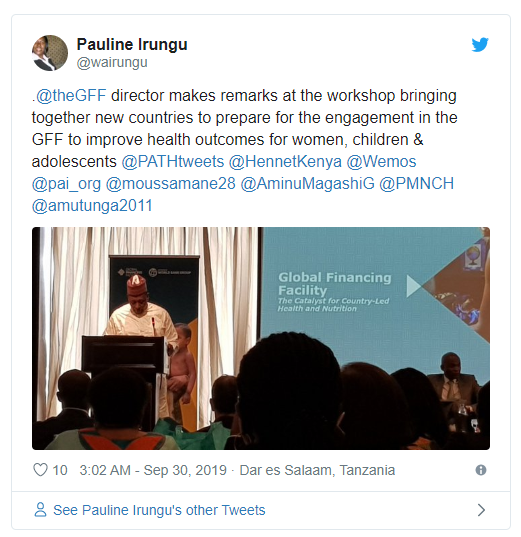Delegates from New Countries Meet in Tanzania to Learn about GFF Process
The Global Financing Facility and the Government of Tanzania hosted a workshop for new GFF-supported countries in Dar es Salaam from Sept. 30- Oct. 4, 2019. The workshop brought together country teams from the 10 newest GFF-supported countries to create an enhanced understanding of the GFF approach, including the development of the Investment Case and country platform processes, and foster agreement among country teams on immediate next steps when returning to their country.
The participants included delegates from the governments of Chad, Ghana, Mali, Mauritania, Niger, Pakistan, Somalia, Tajikistan, Zambia, and Zimbabwe, as well as country- and global-level representatives from civil society, the private sector and UN and partner implementing and financing agencies. Representatives from Burkina Faso, Central African Republic, Cote d’Ivoire, Nigeria and Senegal also attended the workshop to share their experiences with the GFF and lessons learned from the perspective of their countries.
The Deputy Minister of Health from Tanzania, Dr. Faustin Ndungulile, provided welcoming remarks and highlighted the progress Tanzania -one of the first GFF countries- has made with implementing One Plan II, which serves as the Investment Case, with increases in institutional deliveries to 77% and each health facility now being a cost center. He welcomed the 10 countries and expressed excitement about the GFF’s recent expansion to 36 countries.
 GFF Director Muhammad Pate shared firsthand experience from his previous role as Minister of State for Health in Nigeria, including the importance of how government ownership and partner alignment is essential to address the drivers and systemic challenges for improved access to quality, affordable health care.
GFF Director Muhammad Pate shared firsthand experience from his previous role as Minister of State for Health in Nigeria, including the importance of how government ownership and partner alignment is essential to address the drivers and systemic challenges for improved access to quality, affordable health care.
“The technical aspect of what we do in health is important, but we should be rigorous, and we should have the best evidence,” Pate said. “But to translate this into action, we have to also look at the political context we are operating in. We have to position ourselves with the whole of government perspective, not narrow, in our own corner. We have to build alliances with key actors … it’s really about the agenda that we are trying to solve.”
Country delegations spent the week learning about the country-led process for developing an Investment Case, and the importance of prioritization, coordinated financing, implementation, and learning. Country teams worked on the fictitious case study of “Mundiland” each day as an exercise to identify underlying problems and bottlenecks and realize the importance of using available data and evidence to ensure clarity on the results from reproductive, maternal, newborn, child and adolescent health and nutrition (RMNCAH-N), health systems strengthening, health financing. Based on reflections from the case study, the teams developed an action plan for their own country that described next steps and actions to strengthen the GFF process in their own country.
In addition to daily plenary sessions and group work, participants spent a day in the field visiting three different districts in the Pwani region. Participants visited dispensaries, health centers, and hospitals. During the visit, the participants received an update on reproductive child health services, learned how supply chain challenges have been addressed and how results-based and decentralized facility financing has helped improve service delivery.
At the end of the week, the country teams presented their reflections from the workshop, their thoughts on the added value of the GFF, as well as highlighted the key next steps for developing the Investment Case.